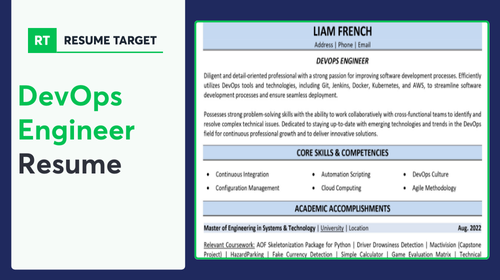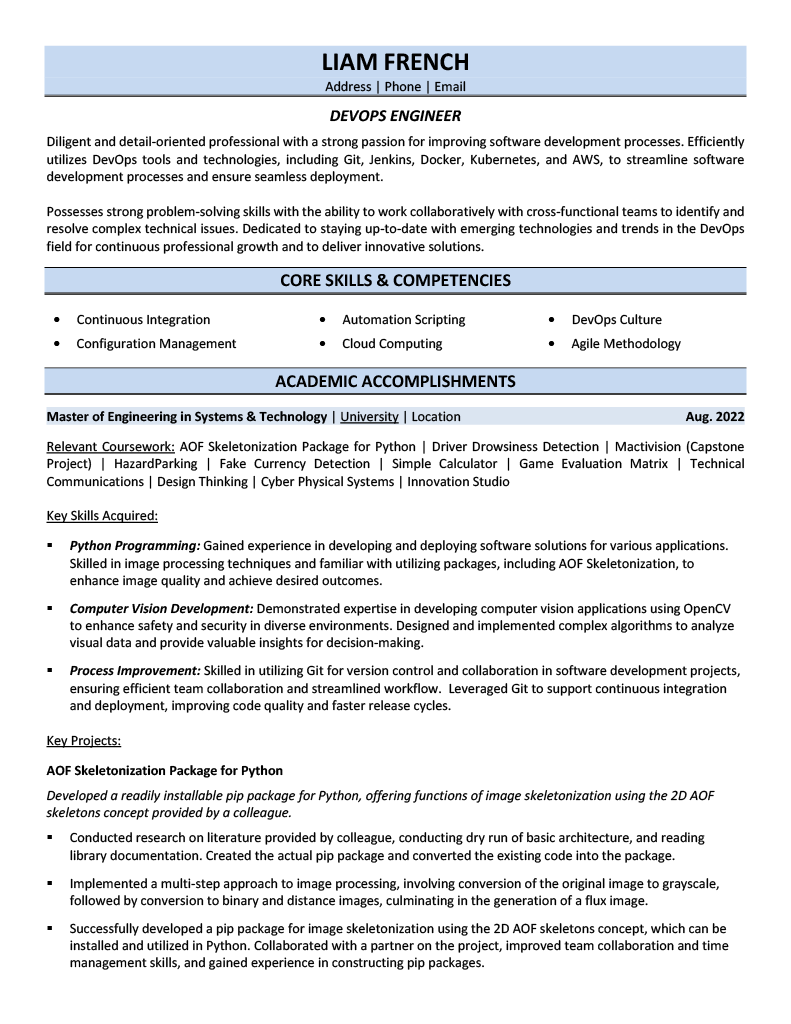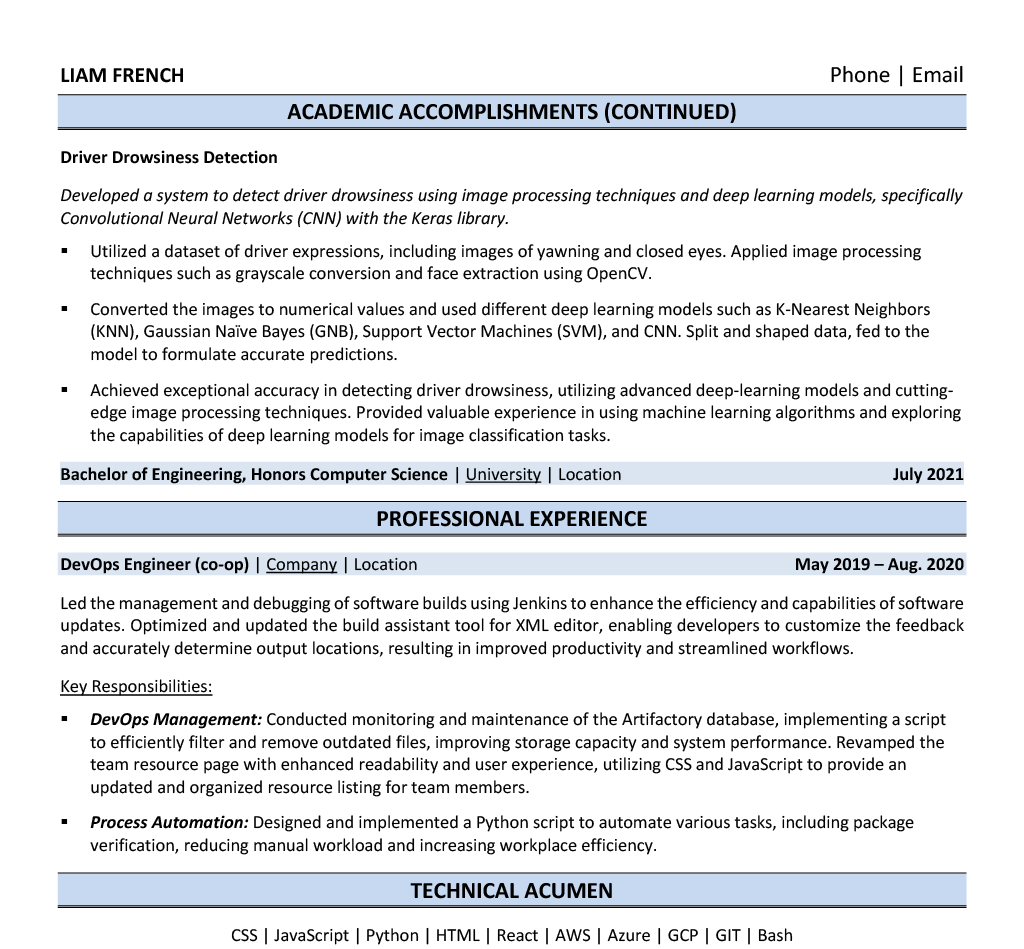

In the fast-paced world of DevOps, your complex technical achievements can get lost in translation on paper. Your resume needs to bridge the gap between technical expertise and business impact.
Are you struggling to showcase both your coding skills and your operational wins in a way hiring managers understand? A strategic DevOps resume transforms your daily work into compelling achievements that catch a recruiter's attention.
Resume Target specializes in helping DevOps professionals translate technical jargon into powerful success stories. We'll help you craft a resume that speaks both to technical leads and C-level executives, positioning you for the best opportunities in the field.


At the intersection of software development and IT operations, DevOps Engineers serve as the crucial bridge-builders who ensure applications run smoothly and securely through the entire software development life cycle (SDLC).
These technical orchestrators spend their days coordinating between development and operations teams, implementing automated deployment pipelines, monitoring system performance, and ensuring that code moves seamlessly from development to production without compromising security or stability.
If you're interested in combining coding expertise with operational knowledge, the DevOps career path offers exciting opportunities to shape how modern organizations deliver software, with roles ranging from junior DevOps engineer to enterprise DevOps architect.
Let's talk about what's exciting in the DevOps Engineering field - your career path could lead to some impressive earning potential! As companies continue investing heavily in cloud infrastructure and automation, DevOps Engineers are becoming increasingly valuable team members, commanding competitive compensation packages across all experience levels.
Figures from: Levels.fyi
Note: I've broken down the salary ranges based on typical industry progression, using the median salary of $143,668 as a reference point for the Professional level. The ranges are structured to show realistic progression while maintaining the median data point from the source.DevOps engineering offers a dynamic career path from junior positions to leadership roles. Starting as a release manager, you can progress to architect or reliability engineering positions while building both technical and collaborative skills.
To accelerate your DevOps career, you'll need to master both technical expertise and leadership capabilities that go well beyond basic coding skills.
- Cloud Platform Expertise (AWS, Azure, GCP) - Automation and CI/CD Pipeline Management - Container Orchestration (Docker, Kubernetes) - Cross-functional Team LeadershipBreaking into DevOps starts with mastering fundamental IT skills through entry-level positions like System Administrator or Software Developer, while building automation and cloud computing expertise.
To advance in your DevOps career, you'll need to develop both technical expertise and soft skills, with Linux fundamentals, automation capabilities, and strong collaboration abilities forming your professional foundation.
• Junior System Administrator • Help Desk Technician • Junior Software Developer • Junior Cloud Engineer • IT Support Specialist • Junior Quality Assurance EngineerRequirements from Bluelight
From Silicon Valley to emerging tech hubs, DevOps engineers are in high demand across finance, healthcare, and tech sectors.
Figures from DevOps Connect Hub
Struggling to showcase your CI/CD pipelines, infrastructure automation, and cloud expertise in a way that catches a hiring manager's attention? This comprehensive, section-by-section guide will help you craft a DevOps Engineer resume that clearly demonstrates your technical prowess and business impact.
If you're like most DevOps engineers, condensing your technical expertise and achievements into a few powerful lines feels as challenging as debugging a complex production issue.
While you excel at streamlining workflows and bridging the gap between development and operations teams, translating those valuable skills into compelling resume content that catches a hiring manager's attention requires a different kind of automation strategy.
How would you describe your unique blend of technical expertise across infrastructure automation, CI/CD pipelines, and cloud platforms that sets you apart from other DevOps professionals?
Reason: This helps establish your technical foundation while highlighting your distinctive combination of skills that make you valuable in the DevOps space. It allows recruiters to quickly understand your core competencies and technical depth.
What is your overarching philosophy or approach to bridging development and operations teams while maintaining security and scalability in enterprise environments?
Reason: This reveals your strategic thinking and understanding of DevOps culture beyond just technical skills, showing potential employers how you can drive organizational transformation and collaboration.
How have you evolved as a DevOps professional in terms of adapting to new technologies and methodologies while maintaining system reliability and performance?
Reason: This demonstrates your adaptability and commitment to continuous learning while emphasizing your focus on maintaining operational excellence, which are crucial qualities employers seek in DevOps engineers.
As a DevOps Engineer, you need to showcase both your technical expertise in automation and infrastructure as well as your ability to bridge development and operations teams effectively.
Your skills section should highlight your proficiency with CI/CD pipelines, cloud platforms like AWS or Azure, containerization tools like Docker and Kubernetes, and your experience with infrastructure as code, while also emphasizing your collaborative abilities and problem-solving approach.
Showcase your DevOps expertise by structuring your experience into three powerful sections: a high-level role overview highlighting your technical environment, measurable achievements that spotlight your automation and deployment wins, and core responsibilities that demonstrate your infrastructure and CI/CD mastery.
Many DevOps Engineers struggle to effectively demonstrate how their technical implementations and automation efforts translate to tangible business value. Transform your achievements into compelling metrics by connecting your deployment improvements, infrastructure optimizations, and automation solutions to measurable impacts on deployment frequency, system reliability, and cost reduction.
The responsibilities section demonstrates how DevOps Engineers bridge development and operations to create efficient, automated systems. Your duties should highlight both technical expertise and business impact while showing how you streamline deployment processes and maintain system reliability.
Your technical certifications are crucial proof points of your DevOps expertise, so list your most current cloud and automation credentials first. While formal education matters, employers in the DevOps space are particularly interested in seeing industry-recognized certifications from major platforms like AWS, Azure, or Google Cloud, along with container orchestration and CI/CD tooling credentials.
Now that you've built a strong foundation following Resume Target's expert guidelines, you have an impressive DevOps Engineer resume ready for fine-tuning.
While many candidates stop at customizing their cover letter, successful DevOps professionals know that personalizing their resume for each role is what sets them apart in this competitive field.
By strategically incorporating specific DevOps tools, methodologies, and keywords from each job posting, your tailored resume will sail through ATS systems and show hiring managers you're the perfect match for their unique technical environment and team culture.
Ready to transform your resume into a powerful tool that speaks directly to employers? Let's make your DevOps expertise impossible to ignore!
Don't let a lack of professional experience hold you back from launching your DevOps Engineer career! Your journey into tech ops can shine through your educational background, coding projects, and any cloud platform experience you've gained through coursework or personal projects.
Focus on highlighting your technical skills, automation tools knowledge, and any CI/CD pipeline experience you've developed through academic projects.
Check out our Student Resume Writing Guide to learn how to best present your coding projects, certifications, and collaborative development experience.
Your entry-level DevOps resume summary is your chance to showcase how your technical education, coding projects, and cloud platform experience make you an ideal candidate for this dynamic role.
Focus on highlighting your hands-on experience with CI/CD pipelines, containerization tools, and automation projects - even if they were completed during coursework or internships.
"Detail-oriented and technically skilled DevOps Engineer with foundational experience in cloud infrastructure and continuous integration practices through academic projects and internships. Proficient in Docker, Jenkins, and AWS cloud services, having successfully implemented automated deployment pipelines for three full-stack applications. Demonstrated ability to optimize development workflows and collaborate with cross-functional teams during university projects. Seeking to leverage strong automation and problem-solving skills to drive operational efficiency as a DevOps Engineer."
Now's your chance to showcase how your educational background has prepared you for the dynamic world of DevOps engineering and cloud infrastructure!
Transform your academic experience into compelling content by highlighting relevant coursework like "Cloud Architecture"or "CI/CD Pipeline Development,"along with any hands-on projects where you implemented automation tools or managed deployment workflows.
1. The names of courses and certifications common to a degree/certification for DevOps Engineers include: Introduction to DevOps, IBM DevOps and Software Engineering, IBM Applied DevOps Engineering, DevOps Mastery, Preparing for Google Cloud Certification: Cloud DevOps Engineer, DevOps Complete Course [1], AWS Certified DevOps Engineer [2, 5], Google's Professional Cloud DevOps Engineer [5], and coursework in programming languages, coding processes, software development, and IT operations as part of a Computer Science degree [5].Relevant Coursework: Introduction to DevOps | Software Engineering Principles | Cloud Computing Architecture | Programming Languages & Frameworks | IT Operations Management | Continuous Integration/Deployment
Key Projects:
Automated Deployment Pipeline Implementation: Designed and implemented an end-to-end CI/CD pipeline for a web application, reducing deployment time by 60% and eliminating manual deployment errors.
Cloud Migration Project: Led a team of 4 students to migrate a monolithic application to a microservices architecture on AWS, improving scalability and reducing operational costs.
Leverage your educational background, certification training, and hands-on project experience to showcase the technical and collaborative skills that make you an ideal candidate for DevOps positions.
As an entry-level DevOps Engineer, your foundation in these core technologies positions you perfectly for a field that continues to grow rapidly, with increasing demands for professionals who can bridge development and operations effectively.
When you're juggling multiple tools, platforms, and methodologies, it can feel impossible to capture your full technical scope while keeping your resume clear and impactful for hiring managers.
At Resume Target, we specialize in crafting resumes for DevOps professionals that perfectly balance technical expertise with business impact.
Our writers understand the unique challenges of showcasing both your coding abilities and your operational achievements, having helped countless DevOps engineers land roles at leading tech companies.
With the rapid evolution of cloud technologies and increasing demand for DevOps talent, now is the perfect time to transform your resume into a powerful career tool - let's connect for a free consultation today.
Impress any hiring manager with our IT resume writing service. We work with all career levels and types of IT professionals.
Learn More → IT Resume Writing Services